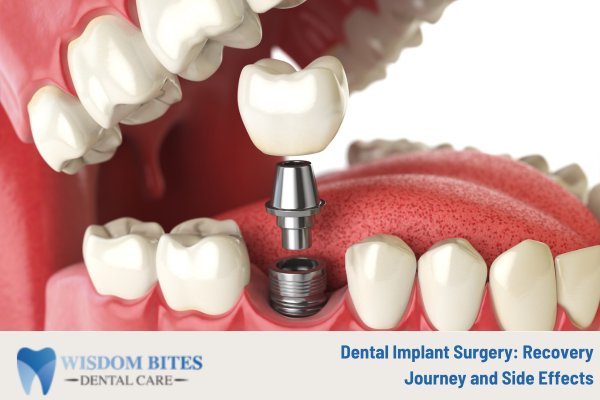Dental implants have revolutionized modern dentistry, offering a permanent solution for missing teeth. Dr. Siddhartha Mitra, a leading dental surgeon in Kolkata, specializes in implant surgeries, ensuring patients regain both function and aesthetics. If you’re considering dental implants, understanding the recovery process and potential side effects is essential to ensure a smooth journey.
The Recovery Journey After Dental Implant Surgery
Dental implant surgery involves placing titanium posts into the jawbone, which act as anchors for artificial teeth. While the procedure is relatively common, the recovery journey can vary from person to person based on factors like the number of implants, bone density, and overall health.
1. Immediate Post-Surgery Care
Right after the surgery, it’s normal to experience swelling, minor bleeding, and discomfort. Dr. Mitra recommends the following steps for a smooth initial recovery:
- Rest: Avoid strenuous activities for the first 48 hours post-surgery.
- Ice Packs: Apply ice packs to reduce swelling in the affected area.
- Pain Management: Over-the-counter pain relievers, or those prescribed by Dr. Mitra, can help manage discomfort.
- Soft Diet: Stick to a soft diet for the first few days, such as yogurt, soups, and smoothies, to prevent pressure on the implant site.
2. Healing and Osseointegration
The next phase of recovery, known as osseointegration, involves the implant fusing with the jawbone. This process can take anywhere from 3 to 6 months. During this time:
- Avoid Hard Foods: Chewing on hard or crunchy foods can disrupt the healing process. Stick to soft, easy-to-chew options.
- Maintain Good Oral Hygiene: Gently brush around the implant area to avoid infection.
- Regular Check-ups: Dr. Mitra will schedule follow-up visits to monitor the implant’s progress and ensure there are no complications.
3. Full Recovery and Implant Placement
Once the implant has successfully integrated with the bone, the final step involves placing the permanent crown or bridge. After this, patients can enjoy their new, fully functional teeth. Dr. Mitra ensures that each patient receives personalized care, allowing for a full return to normal eating and smiling confidently.
Potential Side Effects of Dental Implant Surgery
While dental implant surgery is generally safe, it’s essential to be aware of potential side effects to manage them effectively.
1. Infection
Infections can occur at the implant site if proper oral hygiene isn’t maintained. Signs include redness, swelling, and pus around the area. Dr. Mitra advises patients to follow strict hygiene practices and report any signs of infection immediately.
2. Nerve Damage
Although rare, nerve damage can happen if the implant is placed too close to a nerve. This can result in numbness or tingling in the lips, gums, or chin. Dr. Mitra takes extra care during surgery to avoid this complication.
3. Sinus Issues
For upper jaw implants, there’s a slight risk of the implant protruding into the sinus cavity. In such cases, Dr. Mitra recommends sinus lifts before surgery to create adequate space for the implant.
4. Implant Failure
Though uncommon, implant failure can occur if the implant doesn’t integrate with the bone properly. Smoking, poor oral hygiene, or pre-existing conditions like diabetes can increase this risk.
Conclusion
Dental implant surgery offers a permanent solution for missing teeth, but understanding the recovery journey and potential side effects is crucial. With expert guidance from Dr. Siddhartha Mitra, Kolkata’s best dental surgeon, patients can look forward to a smooth recovery and a confident, functional smile.
